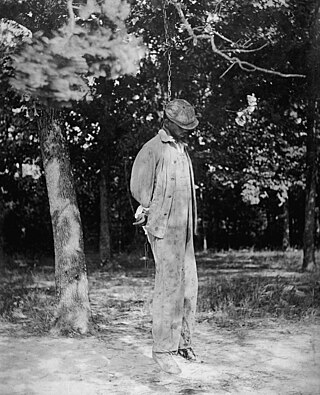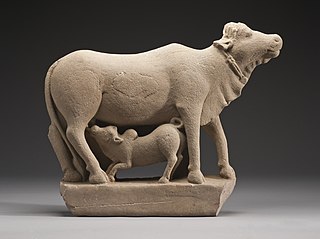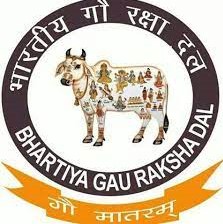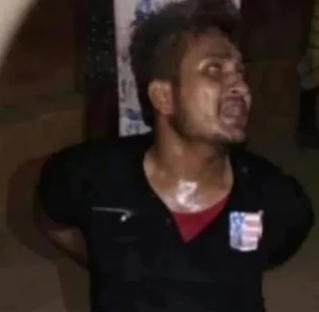Related Research Articles

Lynching is an extrajudicial killing by a group. It is most often used to characterize informal public executions by a mob in order to punish an alleged transgressor, punish a convicted transgressor, or intimidate people. It can also be an extreme form of informal group social control, and it is often conducted with the display of a public spectacle for maximum intimidation. Instances of lynchings and similar mob violence can be found in every society.

There are varying beliefs about cattle in societies and religions.

Bajrang Dal is a Hindu nationalist militant organisation that forms the youth wing of the Vishva Hindu Parishad (VHP). It is a member of the right-wing Sangh Parivar. The ideology of the organisation is based on Hindutva. It was founded on 1 October 1984 in Uttar Pradesh, and began spreading more in the 2010s throughout India, although its most significant base remains the northern and central portions of the country.

On 7 November 1966, a group of Hindu protestors, led by ascetics, naga sadhus and backed by Rashtriya Swayamsevak Sangh and Bharatiya Jana Sangh, approached the Indian Parliament to protest to criminalize cow slaughter. The incident resulted in a riot which ended with a death toll of 7 people and hundreds were injured. The total damage was estimated at about 1 billion rupees by city officials; numerous vehicles were destroyed, along with numerous shops.
Religious violence in India includes acts of violence by followers of one religious group against followers and institutions of another religious group, often in the form of rioting. Religious violence in India has generally involved Hindus and Muslims.
The cow protection movement is a predominantly Indian religious and political movement aiming to protect cows, whose slaughter has been broadly opposed by Hindus, Buddhists, Jains, Zoroastrians and Sikhs. While the opposition to slaughter of animals, including cows, has extensive and ancient roots in Indian history, the term refers to modern movements dating back to colonial era British India. The earliest such activism is traceable to Namdhari (Kooka) Sikhs of Punjab who opposed cow slaughter in the 1860s. The movement became popular in the 1880s and thereafter, attracting the support from the Arya Samaj founder Swami Dayananda Saraswati in the late 19th century, and from Mahatma Gandhi in the early 20th century.

Cattle slaughter in India, especially cow slaughter, is controversial because of cattle's status as endeared and respected living beings to adherents of Dharmic religions like Hinduism, Buddhism, Sikhism and Jainism. Also, many of the Zoroastrians/Parsis living in India stopped eating beef out of respect, as it is sacred for the people of Dharmic religions; while it is an acceptable source of meat in Abrahamic religions like Islam, Christianity and Judaism. Cow slaughter has been shunned for a number of reasons, specifically because of cow's association with Lord Krishna in Hinduism, and because cattle have been an integral part of rural livelihoods as an economic necessity. Cattle slaughter has also been opposed by various Indian religions because of the ethical principle of Ahimsa (non-violence) and the belief in the unity of all life. Legislation against cattle slaughter is in place throughout most states and territories of India.
On 9 October 2015, Prashanth Poojary, a Hindu man from the town of Moodabidri in Dakshina Kannada, Karnataka, was killed by Muslim extremists.
2016 Jharkhand mob lynching refers to the case of lynching of three Muslim cattle traders by allegedly cattle-protecting vigilantes in Balumath forests of Latehar district in the Indian state of Jharkhand on 18 March 2016. The attackers killed 32 year old Mazlum Ansari and 12 year old Imtiaz Khan who were both found hanging from a tree.
Animal welfare and rights in India regards the treatment of and laws concerning non-human animals in India. It is distinct from animal conservation in India.

The Bhartiya Gau Raksha Dal is a Hindu nationalist and right-wing federation of cattle protection movements in India affiliated with the Rashtriya Swayamsevak Sangh and a member of the Sangh Parivar. It provides guidance and support in the construction of protective shelters for cattle and is supporting cattle protection movements all over India. This organization is not affiliated with any political party, its members are all volunteers and it was founded in 2012 by Pawan Pandit.

The 2017 Alwar mob lynching was the attack and murder of Pehlu Khan, a dairy farmer from Nuh district of Haryana, allegedly by a group of 200 cow vigilantes affiliated with right-wing Hindutva groups in Behror in Alwar, Rajasthan, India on 1 April, 2017. Six others who were with Pehlu Khan were also beaten by the cow vigilantes.
Cow vigilante violence is a pattern of mob-based collective vigilante violence seen in India. The attacks are perpetuated by Hindu nationalists against non-Hindus to protect cows, which are considered sacred in Hinduism.
The 2017 Pratapgarh lynching refers to death of Zafar Khan, a political activist and member of Communist Party of India (Marxist-Leninist) based in the Pratapgarh district of Rajasthan on 16 June 2017 when he tried to stop 5 employees of the Pratapgarh municipality from taking pictures of women defecating in public. This is the second lynching case in Rajasthan after the killing of a Muslim dairy farmer by cow protection vigilantes in April 2017.
Cattle theft, more commonly cattle raiding or cattle lifting, is a property crime in India. In the ancient and medieval era India texts, stealing cattle is described as a crime and sin, a motif that appears in Hindu mythologies.
The Indian WhatsApp lynchings are a spate of mob-related violence and killings following the spread of rumours, primarily relating to child-abduction and organ harvesting, via the WhatsApp message service. The spate of lynchings commenced in May 2017 with the killing of seven men in Jharkhand, but did not become a matter of national attention until the beginning of the following year. Fake messages customised with locally specific details are circulated along with real videos attached to fake messages or claims.

On 17 June 2019, 24-year-old Tabrez Ansari was attacked by a lynch mob in Jharkhand, India. Ansari, a Muslim, was tied to a tree, brutally beaten and forced to chant Hindu religious slogans. He died four days later. The incident came to light after a video of the lynching went viral. The attackers accused him of bike theft. India's Prime Minister commented on this lynching in the Parliament of India.
Karwan-e-Mohabbat, sometimes written as Karwan e Mohabbat, also known as Peace Yatra, is a countrywide civilian campaign in India that was first launched in September 2017 in solidarity with the victims of mob lynching or victimised during the communal or religiously motivated violence. The campaign was actively conducted after a series of extrajudicial killings took place such as 2015 Dadri mob lynching, and later cow vigilante violence that resulted in several crimes, including mob lynching.
The 2015 Dadri lynching refers to case of lynching in which a mob of villagers attacked the home of 52 year-old Mohammed Akhlaq, killing him, for suspicion of slaughtering a cow. The attack took place at night, on 28 September 2015 in Bisahda village, near Dadri in Uttar Pradesh, India. The mob consisting of local villagers, attacked Akhlaq's house with sticks, bricks and knives, saying that they suspected of him stealing and slaughtering a cow calf.
The 2023 Haryana riots commonly referred to as the Nuh violence were a series of clashes in northern India that originated in the state of Haryana and have subsequently spread to nearby regions. On 31 July 2023, communal violence erupted in the Nuh district of Haryana between Muslims and Hindus during an annual Brajmandal Yatra pilgrimage organised by the Vishva Hindu Parishad (VHP), a Hindu nationalist organization. By the evening of the same day, fresh incidents of communal violence were reported from Gurugram and Sohna. As of 3 August 2023, the situation has resulted in at least seven fatalities and over 200 reported injuries.
References
- ↑ John R. McLane (8 March 2015). Indian Nationalism and the Early Congress. Princeton University Press. pp. 276–283. ISBN 978-1-4008-7023-3.
- 1 2 3 4 5 6 Mushirul Hasan; Asim Roy (2005). Living Together Separately: Cultural India in History and Politics. Oxford University Press. pp. 132–133, 135–139, 143–145. ISBN 978-0-19-566921-3.
- ↑ Ishrat Haque (1992). Glimpses of Mughal Society and Culture. Concept. p. 92. ISBN 978-81-7022-382-5.
- 1 2 Govind Sadashiv Ghurye (1968). Social tensions in India . Popular Prakashan. pp. 305–306.
- ↑ Partha Sarathy Ghosh (1999). BJP and the Evolution of Hindu Nationalism. Manohar. pp. 155–156. ISBN 978-81-7304-253-9.
- ↑ James Campbell (1879). Gazetteer of the Bombay Presidency, Volume IV: Ahmedabad. Government Central Press. p. 256.
- ↑ Mark Doyle (2016). Communal Violence in the British Empire: Disturbing the Pax. Bloomsbury Academic Publishing. pp. 249 note 16. ISBN 978-1-4742-6826-4.
- ↑ Peter van der Veer (1994). Religious Nationalism: Hindus and Muslims in India. University of California Press. pp. 90–91. ISBN 978-0-520-08256-4.
- ↑ Barbara D. Metcalf; Thomas R. Metcalf (2012). A Concise History of Modern India. Cambridge University Press. pp. 152–153. ISBN 978-1-139-53705-6.
- ↑ Yang, Anand A. (1980). "Sacred Symbol and Sacred Space in Rural India: Community Mobilization in the "Anti-Cow Killing" Riot of 1893". Comparative Studies in Society and History. 22 (4). Cambridge University Press: 576–596. doi:10.1017/s0010417500009555. S2CID 143728142.
- 1 2 3 Judith E. Walsh (2006). A Brief History of India. Infobase Publishing. pp. 161–162. ISBN 978-1-4381-0825-4.
- ↑ Mark Doyle (2016). Communal Violence in the British Empire: Disturbing the Pax. Bloomsbury Academic Publishing. pp. 157–161. ISBN 978-1-4742-6826-4.
- ↑ P. Hardy (1972). The Muslims of British India . Cambridge University Press. pp. 140–141. ISBN 978-0-521-09783-3., Quote: "This assertiveness expressed itself in violent defense of the cow. (...) In the early nineties [1890s], rioting spread to the United Provinces and Bihar and in August 1893 there was a major disturbance in Bombay, in which several hundred people were killed or injured."
- ↑ Matthew Groves. "Law, Religion and Public Order in Colonial India: Contextualising the 1887 Allahabad High Court Case on 'Sacred' Cows". South Asia: Journal of South Asian Studies: 96–97.
- 1 2 3 4 John R. McLane (8 March 2015). Indian Nationalism and the Early Congress. Princeton University Press. pp. 314–315. ISBN 978-1-4008-7023-3.
- ↑ Copland, Ian (2005). "What to do about cows? Princely versus British approaches to a South Asian dilemma". Bulletin of the School of Oriental and African Studies. 68 (1). Cambridge University Press: 59–76. doi:10.1017/s0041977x05000030. S2CID 159537827.
- 1 2 3 Gene R. Thursby (1975). Hindu-Muslim Relations in British India: A Study of Controversy, Conflict, and Communal Movements in Northern India 1923-1928 . BRILL Academic. pp. 80–83. ISBN 90-04-04380-2.
- ↑ Nitish K. Sengupta (2011). Land of Two Rivers: A History of Bengal from the Mahabharata to Mujib. Penguin. pp. 347–348. ISBN 978-0-14-341678-4.
- ↑ R Batabyal (2005). Communalism in Bengal: From Famine To Noakhali, 1943-47. SAGE Publications. pp. 279–280. ISBN 978-0-7619-3335-9.
- ↑ Govind Sadashiv Ghurye (1968). Social tensions in India . Popular Prakashan. pp. 313–314.
- ↑ Govind Sadashiv Ghurye (1968). Social tensions in India . Popular Prakashan. pp. 335–344.
- 1 2 Ian Copland; Ian Mabbett; Asim Roy, Kate Brittlebank and Adam Bowles (2013). A History of State and Religion in India. Routledge. pp. 237–239. ISBN 978-1-136-45950-4.
- ↑ Indrani Jagjivan Ram (2010). Milestones: A Memoir. Penguin Books. pp. 215–218. ISBN 978-0-670-08187-5.
- ↑ Promilla Kalhan (1997). Gulzarilal Nanda: A Life in the Service of the People. Allied Publishers. pp. 54–57, 120–131. ISBN 978-81-7023-693-1.
- ↑ "World Report 2003 - India". Human Rights Watch .
- ↑ U.S. Department of State (2004). "India: International Religious Freedom Report 2004; BUREAU OF DEMOCRACY, HUMAN RIGHTS, AND LABOR" . Retrieved 2017-05-24.
- ↑ People's Union for Democratic Rights (2009), "Dalit Lynching at Dulina: Cow-Protection, Caste and Communalism", in Ujjwal Kumar Singh (ed.), Human Rights and Peace: Ideas, Laws, Institutions and Movements, SAGE Publications, p. 155, ISBN 978-81-7829-884-9 , Quote: "It needs to be recalled that the very first response of the VHP and the Gauraksha Samiti was to glorify the killings as just retribution for the sin of cow-slaughter. The social identity of the victims appeared unimportant, except that they were possibly cow-slaughterers".
- ↑ People's Union for Democratic Rights (2009), "Dalit Lynching at Dulina: Cow-Protection, Caste and Communalism", in Ujjwal Kumar Singh (ed.), Human Rights and Peace: Ideas, Laws, Institutions and Movements, SAGE Publications, p. 155, ISBN 978-81-7829-884-9 , Quote: "Noticeably none of the groups concerned, including the state, disputed that the response of the mob was a completely understandable response to cow-slaughter. The emphasis was rather on the truth value of the allegation itself. It is evident that the issue of cow-protection is central to an understanding of the incident."
- ↑ Pandher, Sarabjit (2012-06-11). "Cow slaughter reports trigger violence in Punjab town". The Hindu. ISSN 0971-751X . Retrieved 2019-08-17.
- ↑ "27 policemen among 35 injured in Indore violence". The Pioneer. Retrieved 2019-08-17.
- ↑ "Mobs against cow slaughter attack vehicles, police". Firstpost. 31 August 2013. Retrieved 2019-08-17.
- ↑ "DOTO - Documentation Of The Oppressed". dotodatabase.com. Retrieved 2018-08-01.
- ↑ "Mangalore: Inebriated sadists brutally attack youth while transporting cattle". Coastaldigest.com - The Trusted News Portal of India, Coastal Karnataka. 2014-08-24. Retrieved 2019-08-17.
- ↑ "DOTO - Documentation Of The Oppressed". dotodatabase.com. Retrieved 2018-08-01.
- ↑ "DOTO - Documentation Of The Oppressed". dotodatabase.com. Retrieved 2018-08-01.
- ↑ "DOTO - Documentation Of The Oppressed". dotodatabase.com. Retrieved 2018-08-01.
- 1 2 3 4 5 6 7 8 "India: 'Cow Protection' Spurs Vigilante Violence". 27 April 2017.
- ↑ "Indian mob kills man over beef eating rumour". Al Jazeera . 1 October 2015. Retrieved 4 October 2015.
- ↑ "'Cow vigilante' team shoots dead migrant in Karnal". hindustantimes.com. 2015-12-09. Retrieved 2018-07-31.
- ↑ "India muslim couple attacked over rumours of carrying beef". BBC.
- ↑ "Muslim Cattle Traders Beaten To Death In Ranchi, Bodies Found Hanging From A Tree". Huffington Post India.
- ↑ "Another Dadri-like incident? Two Muslims herding cattle killed in Jharkhand; five held". Zee News. 19 March 2016.
- ↑ "5 held in Jharkhand killings, section 144 imposed in the area". News18. 19 March 2016.
- ↑ Hebbar, Prajakta (19 March 2016). "Muslim Cattle Traders Beaten To Death In Ranchi, Bodies Found Hanging From A Tree". The Huffington Post. Retrieved 19 March 2016.
- ↑ "Four Dalit men stripped, beaten by cow protection vigilantes in Gujarat". Hindustan Times. 12 July 2016. Retrieved 25 July 2017.
- ↑ "Four dalit youths beaten up for eating beef in Karnataka". News18.
- ↑ "Muzaffarnagar: mob attacks muslim family over cow slaughter, two days on no police case filed yet". Indian Express.
- ↑ Raj, Suhasini (5 April 2017). "Hindu Cow Vigilantes in Rajasthan, India, Beat Muslim to Death". The New York Times. Archived from the original on 2023-06-04. Retrieved 2023-11-23.
- ↑ "Beaten to death for being a dairy farmer". BBC News. 8 April 2017.
- ↑ "Cow-protection vigilantes held in Jammu and Kashmir". www.aljazeera.com. Retrieved 6 July 2019.
- ↑ Pratap Singh, Karn (24 April 2017). "3 men transporting buffaloes beaten up in Delhi by 'animal rights activists'". Hindustan Times. Retrieved 25 July 2017.
- ↑ "Four men went Eid shopping; beef rumor consumed one, three hospitalized". International Business Times . Retrieved 23 June 2017.
- ↑ "Man lynched, 3 thrashed over rumours of beef eating on Delhi-Ballabhgarh train route". India Today . Retrieved 23 June 2017.
- ↑ "One lynched, three injured on suspicion of consuming beef near Delhi". India TV . Retrieved 23 June 2017.
- ↑ "Two 'cattle thieves' lynched in Assam". The Indian Express. 1 May 2017. Retrieved 23 June 2017.
- ↑ Mahaprashasta, Ajoy Ashirwad (2 June 2017). "Aftermath of Jharkhand mob lynching is reflective of the State's brewing political turmoil". The Wire (Indian web publication) . Retrieved 2 October 2017.
Days after nine people were killed in four different incidents of mob lynching in the Kolhan division of Jharkhand
- ↑ "Three men beaten to death in West Bengal's Dinajpur district for allegedly stealing cows". The Indian Express. 24 June 2017. Retrieved 24 June 2017.
- ↑ "Muslim dairy owner beaten up, house set on fire in Jharkhand on suspicion of cow slaughter". Hindustan Times. 28 June 2017. Retrieved 29 June 2017.
- ↑ "Man Accused Of Carrying Beef Killed In Jharkhand, Police Says 'Premeditated Murder'". NDTV . Retrieved 29 June 2017.
- ↑ "Cow Vigilantes Gun Down Man in Alwar, Throw Body on Tracks to Show it as Accident". News18. Retrieved 12 November 2017.
- ↑ "Alwar: Muslim Man Transporting Cows Shot Dead Allegedly By 'Gau Rakshaks'". Outlook India. Retrieved 12 November 2017.
- ↑ Muslim man lynched, BBC, 13 November 2017
- ↑ "Two Muslim men lynched in Jharkhand's Godda on suspicion of cattle theft". 2018-06-13.
- ↑ "Two lynched in Jharkhand for stealing cattle". The Hindu. 2018-06-13.
- ↑ "Meat Seller Thrashed by UP Police for 'Cow Slaughter' Dies in AIIMS". The Wire.
- ↑ "45-year-old lynched in UP over cow slaughter rumour | Meerut News - Times of India". The Times of India.
- 1 2 "Supreme Court To Take Up Hapur Lynching On Petition Over NDTV Expose". NDTV.com. Retrieved 2018-08-08.
- ↑ "Cow vigilantes strike in Alwar again, kill youth". Times of India.
- ↑ "In UP, Cow Vigilantes Attack 70-Year-Old Man Who Was Taking His Cow To A Vet". 3 September 2018.
- ↑ "UP cop, civilian killed in clashes over illegal cow slaughter in Bulandshahr". India Today.
- ↑ "Policeman killed in 'cow slaughter' protest". BBC News. 2018-12-03.
- ↑ "Bulandshahr: Yogi terms violence an accident". India Today.
- ↑ "Shaukat Ali's Humiliation and the Dehumanisation of the Human Condition". The Wire. Retrieved 2019-04-15.
- ↑ "Mob lynches villager for allegedly cutting dead bull in Jharkhand's Gumla". 2019-04-12.
- ↑ "Mob Lynching: झारखंड के गुमला में मॉब लिंचिंग, वृद्ध को पीटकर मार डाला; तीन घायल". Dainik Jagran.
- ↑ "Muslim man killed in new suspected India 'cow lynching'". The Straits Times. 2019-05-16. Retrieved 2019-05-16.
- ↑ "Nayeem Ahmad Shah, who was killed by cow vigilantes in Jammu's Bhaderwah, was carrying no animal during attack, claims relative". Firstpost. 16 May 2019. Retrieved 2019-05-16.
- ↑ Ashiq, Peerzada (2019-05-16). "Man shot dead in J&K, cow vigilantes blamed". The Hindu. ISSN 0971-751X . Retrieved 2019-05-16.
- 1 2 3 4 "Three Muslims thrashed, made to chant 'Jai Shri Ram' in MP for allegedly carrying beef, miscreants arrested". The New Indian Express. Archived from the original on May 25, 2019. Retrieved 2019-05-27.
- ↑ "On Video, Woman Among 3 Thrashed Over Beef Rumour In Madhya Pradesh". NDTV.com.
- ↑ "मॉब लिंचिंग : गोरक्षा के नाम पर महिला समेत तीन की पिटाई, वीडियो वायरल". newswing.com. 25 May 2019. Retrieved 26 May 2019.
- 1 2 3 "MP Gau Raksha Attack: Cops Arrest Both Accused and Victims". The Quint. 2019-05-25. Retrieved 2019-05-27.
- ↑ "3 Muslims thrashed by gau rakshaks, made to shout Jai Shree Ram slogans". India Today. Ist. Retrieved 2019-05-27.
- ↑ "Four workers beaten up in India for eating meat". gulfnews.com. Retrieved 2019-06-02.
- ↑ "Mercilessly thrashed for 'eating meat near place of worship', labourers claim they were having vegetarian food | Crime News". www.timesnownews.com. Retrieved 2019-06-02.
- ↑ "Bihar police save man from being lynched by cow vigilantes". 5 July 2019.
- ↑ "Cow vigilantes in Gurugram thrash 2 on suspicion of carrying beef". India Today. Ist.
- ↑ "2 men beaten up by cow vigilantes for allegedly transporting beef in Gurugram". Business Standard India. 27 June 2019.
- ↑ "Bihar: Three Men Beaten to Death by Lynch Mob". thewire.in. The Wire. Retrieved 19 July 2019.
- ↑ "Three men thrashed to death by mob in Baniyapur village in Bihar's Saran district; trio was suspected of stealing cattle". firstpost.com. First Post. 19 July 2019. Retrieved 19 July 2019.
- ↑ "Five arrested for causing violence in name of cow slaughter in Greater Noida". Hindustan Times. 2019-08-10. Retrieved 2019-08-16.
- ↑ Kumar, Satyajeet (September 23, 2019). "Jharkhand: Villagers blame Bajrang Dal workers for Khunti lynching". India Today. Retrieved 8 October 2019.
- ↑ "झारखंड में फिर मॉब लिंचिंग: प्रतिबंधित मांस बेचने के शक में 3 लोगों को बुरी तरह पीटा, एक की मौत". NDTVIndia. Retrieved 8 October 2019.
- ↑ "Months After Tabrez Ansari Lynching, Mob Kills Jharkhand Man Over Suspicion of Cow Slaughter". News18. 23 September 2019. Retrieved 8 October 2019.
- ↑ "Jharkhand again: A man is lynched, two injured over suspicion of cow slaughter". 23 September 2019. Retrieved 8 October 2019.
- ↑ "13 Arrested For Lynching Of 2 Men In Cooch Behar".
- ↑ "Police Arrests 14 After Two Lynched in West Bengal Over Suspicion of Cattle Theft". 22 November 2019.
- ↑ "Muslim Driver Transporting Cattle Brutally Thrashed in Mangalore by Cow Vigilantes". Archived from the original on 23 June 2020. Retrieved 2020-06-22.
- ↑ "[WATCH] Vigilantes stop tempo carrying cattle, brutally thrash driver in Karnataka's Mangaluru". www.timesnownews.com. Retrieved 2020-06-22.
- ↑ "कर्नाटक: भैंसो को ले जा रहे पशु व्यापारी पर बजरंग दल के कार्यकर्ताओं का जानलेवा हमला,टेम्पो को पहुंचाया भारी नुकसान". reportlook.com. 2020-06-15. Archived from the original on 25 June 2020. Retrieved 2020-06-22.
- ↑ "Muslim Meat Trader Attacked in UP, Police File FIR Against Him". The Wire. Retrieved 2022-03-15.
- ↑ "50-year-old man shot dead by cow vigilantes in Mathura". The Telegraph. 2021-06-06. Archived from the original on 2021-06-05. Retrieved 2021-06-17.
- ↑ "Man lynched over cow theft suspicion in Assam's Tinsukia, 12 nabbed". India Today. 2021-06-13. Archived from the original on 13 June 2021. Retrieved 2021-06-17.
- ↑ "Mob lynches man on suspicion of being cow thief in Assam". Press Trust of India. 2021-06-12. Retrieved 2021-06-17.
- ↑ "'Cow vigilantes' lynch MP man transporting cattle in Rajasthan". The Indian Express . 2021-06-15. Archived from the original on 2021-06-15. Retrieved 2021-06-17.
- ↑ "J&K man 'returning home with buffalo' lynched, locals blame cow vigilantes". The Indian Express. 2021-06-23. Retrieved 2022-03-15.
- ↑ "Muslim man lynched on suspicion of carrying beef". www.siast.com. Retrieved 2023-03-08.
- ↑ Sonam Saigal (16 June 2023). "Nashik police probing why lynching victim bought cattle". The Hindu. Archived from the original on 16 June 2023. Retrieved 25 June 2023.
- ↑ "Protests held across India after attacks against Muslims". Reuters. 2017-06-28. Retrieved 2019-08-05.